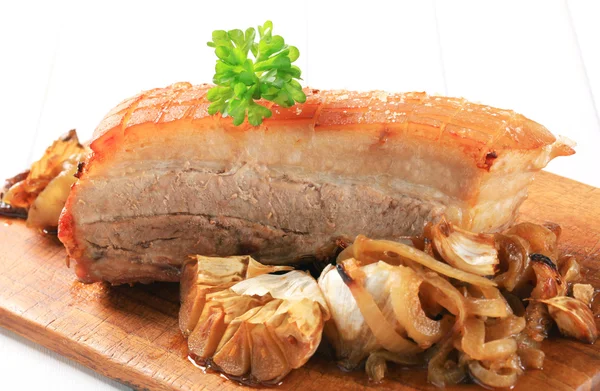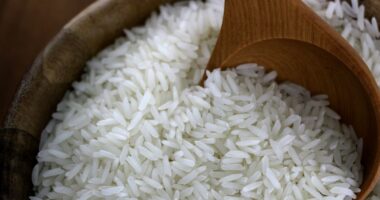Is pork belly healthy to eat for weight loss and heart health? Pork belly is a popular meat dish known for its succulent flavor and versatility. It is high in calories, total fat, and saturated fat compared to other cuts of pork, but it is also a good source of B vitamins, zinc, and other nutrients. While it may not be the best cut of pork for everyone it can still be enjoyed as part of a balanced diet when consumed in moderation. Before we discuss the impact on weight loss and heart health, here are some considerations and nutritional aspects of pork belly:
Portion control: While pork belly is not generally considered a “health food,” it can still be enjoyed as part of a balanced diet when consumed in moderation. Opting for leaner cuts, practicing portion control, and pairing it with nutrient-dense whole foods can help maximize its nutritional benefits.
Culinary versatility: Pork belly can be enjoyed in various ways, such as in Chinese-style red braised pork belly, tonkotsu, or combined with other ingredients in dishes like ramen. The fat in pork belly contributes to the overall richness and flavoring of these dishes, which can be eaten with rice or other whole foods.
It’s important to note that A 4-ounce serving of pork belly packs a punch: 585 calories, 60 grams of fat (including 22 grams of saturated fat), and 11 grams of protein. It’s low in sodium, but a powerhouse of B vitamins, especially thiamine, riboflavin, and B12, supporting your energy, brain, and nervous system, the B vitamins [B1, B2, B3, B5, B6, and B12, ]. While its fat content needs mindful attention, it also boasts healthy monounsaturated fats and minerals like zinc and iron. Here’s a breakdown;
High fat content: Pork belly is about 50% fat, with 40% of that fat being saturated. However, about 50% of the fat in pork belly is monounsaturated, which is associated with the benefits of the Mediterranean Diet, such as reducing belly fat, boosting good cholesterol, and guarding against cancer.
Nutrients: Pork belly is a rich source of vitamins It is also a good source of lean protein.
Is pork belly healthy to eat for weight loss?
No. Pork belly is a high-calorie and high-fat meat cut, which may not be the best choice for people trying to lose weight or decrease calorie intake. Let’s break it down;
A 4-ounce serving of pork belly, packs a hefty 585 calories, contributing significantly to potential calorie surplus that hinders weight loss. It’s loaded with fat, 60 grams per serving, making it energy-dense and potentially leading to weight gain. Of the 60 grams of fat, 22 grams are saturated, potentially increasing heart disease risk if consumed frequently.
However, all hope is not lost! If you truly love pork belly, incorporating it in moderation (think once in a while) is still possible with the following:
- Stick to very small servings, maybe 1-2 ounces, to minimize calorie and fat intake.
- Choose baking, grilling, or roasting instead of frying to reduce fat content.
- Ensure your overall diet focuses on nutrient-rich, low-calorie foods like fruits, vegetables, and whole grains.
Do not forget that weight loss is about managing overall calorie intake and prioritizing healthy choices. Pork belly should be a rare treat, not a regular feature of a weight-loss plan.
Is pork belly healthy to eat for heart health?
When it comes to pork belly and heart health, you need to be careful because of the health implications. Pork belly boasts a 4-ounce serving with 22 grams of saturated fat, representing nearly 10% of the daily recommended intake on a 2,000-calorie diet. Excessive saturated fat consumption can elevate LDL (“bad”) cholesterol, increasing heart disease risk. The calorie-dense is around 585 calories per 4 ounces. Overconsumption can lead to weight gain, a risk factor for heart disease.
Notwithstanding, eating pork in moderation can have some benefits for the heart as it also harbors good fats like monounsaturated and polyunsaturated fats. These “good fats” can decrease LDL cholesterol and boost HDL (“good”) cholesterol, benefiting heart health. Pork belly offers B vitamins, zinc, and iron, vital for overall health and potentially linked to improved cardiovascular function.
The bottom line:
- Pork belly isn’t the ideal choice for optimal heart health due to its saturated fat content.
- Moderate consumption, like an occasional treat, is feasible if you have a healthy, balanced diet rich in fruits, vegetables, whole grains, and lean protein sources.
- Opt for baking, grilling, or roasting over frying to minimize fat retention.
- Individual factors matter: If you have existing heart conditions or high cholesterol, it’s crucial to consult your doctor before including pork belly in your diet.
- Consider your overall health, existing heart disease risk, and cholesterol levels.
- Consult your doctor or a registered dietitian for personalized advice.
Downsides of eating pork belly regularly
Regularly eating pork belly comes with several downsides that could impact your health and well-being:
1. High in calories and fat: Pork belly is notoriously calorie-dense, packing a whopping 585 calories per 4-ounce serving. Additionally, it’s loaded with fat, with 60 grams per serving, making it easy to overconsume calories and contribute to weight gain.
2. Saturated fat concerns: Of the 60 grams of fat, 22 grams are saturated fat. Excessive saturated fat intake can elevate LDL (“bad”) cholesterol, increasing your risk of heart disease, stroke, and other cardiovascular issues.
3. Increased risk of chronic diseases: Regular consumption of pork belly, especially in large portions, is linked to an increased risk of chronic diseases like type 2 diabetes, certain cancers, and inflammatory bowel disease.
4. Digestive issues: The high fat content in pork belly can be difficult to digest for some individuals, leading to discomfort, bloating, and indigestion.
5. Sodium concerns: Processed pork belly often contains added sodium for preservation and flavor enhancement. Excessive sodium intake can contribute to high blood pressure and other health problems.
6. Potential for foodborne illness: If not cooked properly, pork can harbor harmful parasites and bacteria like trichinella and E. coli, leading to foodborne illness.
7. Environmental impact: Large-scale pork production can have negative environmental consequences, including deforestation, water pollution, and greenhouse gas emissions.
In conclusion, while pork belly can be enjoyed occasionally as part of a balanced diet, regular consumption is not recommended due to its high calorie and fat content, saturated fat concerns, potential health risks, and environmental impact. Opting for leaner protein sources and prioritizing fruits, vegetables, and whole grains is key for optimal health and well-being.
ALSO READ: 10 Reasons to Forget Animal-Based and Go Plant-Based for Low-Carb Weight Management
The information in this article is backed by research findings from reliable sources and the image used is from depositphotos.com









